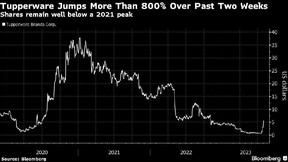Article content
Tupperware Brands Corp. has been warning for months that it may go bust, but that isn’t keeping retail investors away from powering an eye-popping rally reminiscent of the pandemic-era meme stock craze.
Article content
The iconic food-storage container company has soared more than 800 per cent over the past two weeks as investors pile into the stock, dinging short sellers and sparking excitement across retail trader platforms.
Article content
The frenzy shows that the meme-stock phenomenon, which fuelled rallies across heavily shorted companies like GameStop Corp. in 2021 and led to the demise of hedge fund Melvin Capital, isn’t dead. Retail traders have bought US$15-million worth of Tupperware shares since July 21, when the company’s market value stood at US$40 million, data from Vanda Securities show. Since then its more than quintupled to US$224 million.

Tupperware’s ticker was among those trending on retail trader chatroom Stocktwits while mentions on Reddit’s WallStreetBets forum jumped alongside the surging stock price. That’s despite the company warning since April that it had substantial doubt as a going concern and had engaged financial advisers to explore options. In March, it identified a material weakness in its internal controls that forced it to restate prior results.
Article content
On June 30, the company reached a waiver agreement with some of its creditors, but still forecast having insufficient liquidity to make its July interest payment.
Tupperware didn’t immediately respond to requests for comment.
The company’s shares soared during the COVID-19 pandemic, as more people eating at home boosted sales of kitchenware. It didn’t last. The stock dropped 97 per cent in the two and a half years following a January 2021 peak.
The stock’s recent gains have cost short sellers roughly US$37 million in paper losses over the past month, according to data from analytics firm S3 Partners, as the price to short shares surged by more than 10 times.
Still, the stock’s surge is only increasing short interest. Roughly 30 per cent of shares available for trading are currently sold short, the data show, the highest level in more than a year and a spike from less than 10 per cent in November.
The increasing amount of short interest paired with the rising cost to make such bets shows Wall Street isn’t convinced the move higher will last.
-

FOMO drives retail investors to ride AI wave
-

Mom-and-pop investors lost over $1 billion during pandemic
-

Factors that fuelled the growth of the retail investor army
Tupperware shares rallied 31 per cent as of 10:54 a.m. in New York Tuesday to US$5.59, the highest level since November.



